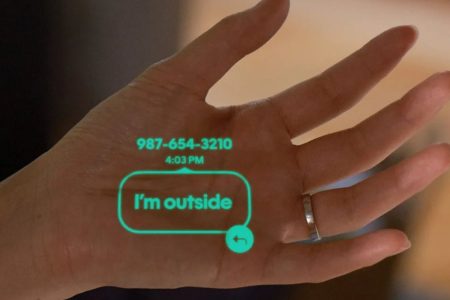
A Chat-GPT screenless phone could be on the horizon and it should be something Apple is worried about when it comes to iPhone.
Apple is already struggling with issues around its own AI with the Apple Intelligence delay and now Chat-GPT‘s OpenAI is reportedly moving into the smartphone market.
While Chat-GPT is already available as an AI on most smartphones, the company behind it is yet to branch out into producing its own hardware – but that looks set to change.
A new report, from The Information, claims that the AI firm is in discussions to acquire io Products.
io Products is a hardware company co-founded by former Apple chief designer Jony Ive and OpenAI CEO Sam Altman.
One of the developments that io Products has confirmed it is working on is an AI powered smartphone that is screenless.
Whatever the company is working on specifically, it appears to be exciting and garnering support. It reportedly received funding from Powell Jobs, the widow of the late co-founder of Apple, Steve Jobs. Funding was expected to reach $1 billion by the end of last year.
OpenAI is allegedly trying to work on a relationship with io Products, so as to access its hardware manufacturing capabilities, so it could begin working on releasing AI powered devices.
This is not new for OpenAI which has already expressed desires to work in the hardware space, hence partnering with Jony Ive on the project. He has said he is working on a device to take on Apple and Samsung, with the report saying the device will, “use AI to create a computing experience that is less socially disruptive than the iPhone.”
The above image is of the Humane AI Pin projecting on a hand, a similar device that claims to offer a voice-powered mobile computer without the need for a screen. This could represent the new wave of devices that Jony Ive is apparently alluding to which use voice rather than a screen to communicate with us more naturally.
Although the idea of everyone in a room interacting with their devices, using voice, does sound more socially disruptive than less.

Luke has over two decades of experience covering tech, science and health. Among many others, Luke writes about health tech…
A $2,300 iPhone? The recent tariffs make that a possibility
Apple’s iPhone might see a serious price hike in response to the recent tariffs, according to a report from Rosenblatt Securities. Analysts suggest the tariffs could result in a price increase of anywhere from 30% to 40%, if Apple chooses to pass the increased costs on to consumers. Neil Shah, an analyst from Counterpoint Research, suggests Apple would need to increase prices by 30% on average, while Rosenblatt analysts say the number is closer to 43%.
To illustrate what that might look like, take a look at the current $799 price point for the iPhone 16. If its price increases by 43%, it would come out to around $1,142. On the other hand, the iPhone 16 Pro Max — currently priced at $1,599 for its base model — could jump to just under $2,300 ($2,286.57, to be exact.)
Read more
I took this luxury iPhone 16 Pro Max rival traveling – here’s what surprised me
Special edition devices are often seen as impractical, unreasonably expensive, and available only in limited quantities. Many also sacrifice functionality for style and luxury. But the Porsche Design Honor Magic 7 RSR breaks that mold. It defies typical luxury phone assumptions, delivers meaningful feature upgrades over the Magic 7 Pro, and doesn’t cost thousands more. This iPhone 16 Pro Max rival is a luxury phone that’s actually functional.
Sure, the Porsche Design Honor Magic 7 RSR isn’t available in the US and is a few hundred Euros pricier than Honor’s 2025 flagship, the Magic 7 Pro. But is it worth the extra cash? I used the phone for two weeks, brought it along on a trip to London, and snapped over 1,000 photos and videos. It might not be for everyone, but if you’re a Porsche fan who wants a useful luxury phone, here’s what you need to know.
Read more
Apple could still move away from physical buttons on iPhone, but not anytime soon
The rumour mill for upcoming smartphones is constantly churning, and that’s especially true when it comes to the next Apple and Samsung devices. For years now, there has been speculation that Apple is considering solid state buttons for its iPhones, which would see it move away from physical buttons like the volume rocker and power buttons.
The rumours first appeared ahead of the iPhone 15 Pro in 2023, and when that didn’t happen, the rumours moved onto claiming we would see this design change for the iPhone 16 Pro. Of course, it didn’t happen then either, and while that’s not to say Apple has given up entirely on the idea, it looks like it might be a while before any switch happens.
Read more
